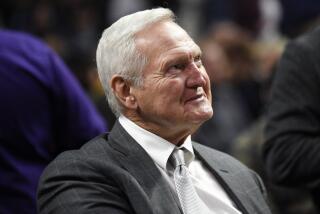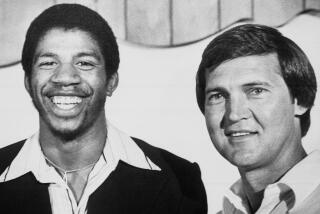ANALYSIS : Signs Pointed to Jordan’s Early Retirement
- Share via
When is a shock not a shock?
No one who watched Michael Jordan struggle with his larger-than-life celebrity for the past three years could be totally surprised at the news he’d decided to retire at age 30, in the prime of what may have been the greatest career basketball ever knew.
Magic Johnson even sensed it. Before the Lakers’ game against the Chicago Bulls in Chicago Stadium in December, 1991, he warned reporters to get off Jordan’s back lest they hassle him out of the game.
Jordan was that night being honored as Sports Illustrated’s man of the year and had just won his first NBA title to go with his two most valuable player awards. He had also just been profiled as a headstrong, ego-driven prima donna in a best-selling book, “The Jordan Rules.” He had recently spurned the Bulls’ trip to the White House to play golf with friends in Hilton Head, S.C., and had been criticized by teammates for requiring a double standard. It had just been revealed that a check of his for $57,000 had been found in the possession of one of his golfing buddies, Slim Bouler, a convicted money launderer.
Jordan was alleged to have lost more than $100,000 in golf bets. He would claim the check to Bouler was a loan although when Bouler went to trial months later, Jordan blithely admitted he had lied.
No one who covered that ceremony in Chicago Stadium ever forgot it. Jordan, at the height of his powers, fame and earning power, was gloomy and talked of trying to survive his travail.
Meanwhile, Johnson, who’d just retired because he was HIV-positive, tried to cheer up Michael.
For Jordan, the All-American boy in legend if not in fact, the various revelations added up to one giant embarrassment.
Easygoing and naturally endearing, he had reaped a commercial windfall--at the end he was making $35 million annually in endorsements--by promoting an image of a homespun young man who’d been a Boy Scout and taken home-ec classes so he could learn to sew and cook.
In real life, Jordan was a charming and exceptionally gracious young man, but an extremely competitive one who no longer concerned himself with merit badges. Hounded by his public, he sought refuge in all-night card games with a coterie of friends from North Carolina. He loved to gamble--at home, in casinos and on golf courses.
He knew few boundaries. During a playoff series against the Philadelphia 76ers in 1990, he spent the night gambling in Atlantic City with a reporter and ran into Coach Phil Jackson on the way back into the hotel lobby at 6 a.m.
“Hi, Coach,” said Jordan.
“Hi, Michael,” said Jackson.
Jordan then took a nap, practiced with the team at 10 a.m., played golf that afternoon and had a big game against the 76ers the next night, leading the Bulls to victory.
Since that night in Chicago, Jordan led the Bulls to two more titles, making them the first team to win three in a row in 27 years. He won his third MVP award, became MVP of the finals for the third year in a row and won his seventh consecutive NBA scoring title, tying Wilt Chamberlain.
But the controversy never ceased.
It might be as penny-ante as in the 1992 finals, when members of Portland golf clubs called the newspapers to report Jordan sightings on the local courses, or the buzz about his well-known but hidden reluctance to join the Dream Team because it would cut into his golf schedule.
It might be a tempest in a teapot as in the ’93 semifinals, when the New York Times quoted two anonymous sources who said Jordan had been in an Atlantic City casino until 2:30 a.m. the day of Game 2.
Or it might be the real thing as in the ’93 finals, when Richard Esquinas, a San Diego sports promoter and another of Jordan’s golfing buddies, claimed that Michael had lost $1.2 million to him in bets.
The mid-summer murder of Jordan’s father, James, was a crushing blow and caught Michael at a vulnerable time, after a three-year campaign that brought him greatness and embarrassment, almost in equal measure.
It is not difficult to imagine that in a year or two, when he has finally gotten a real rest, and when he grows to miss the outlet for his passion to compete that the game provided, he will return.
But no one can know that. For the moment, he is leaving and all basketball will miss him.
There was never anyone like him. That was his problem.
More to Read
All things Lakers, all the time.
Get all the Lakers news you need in Dan Woike's weekly newsletter.
You may occasionally receive promotional content from the Los Angeles Times.







